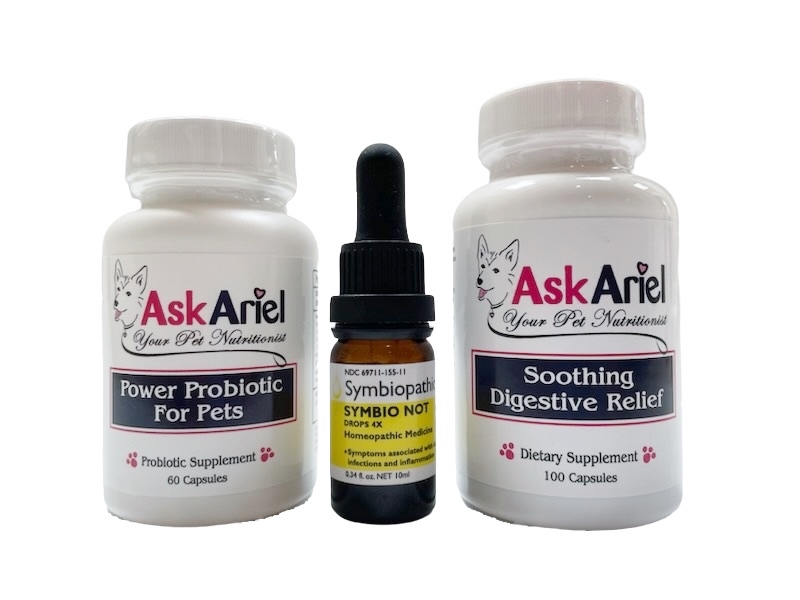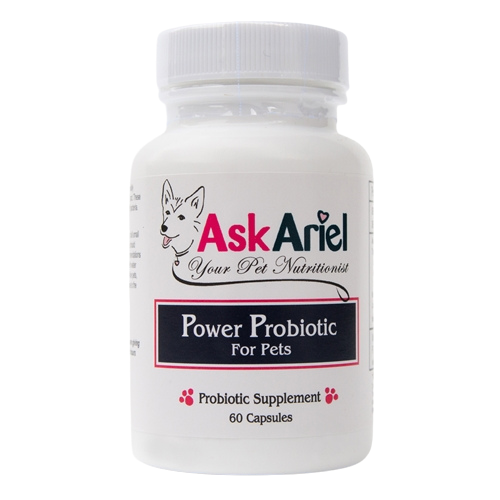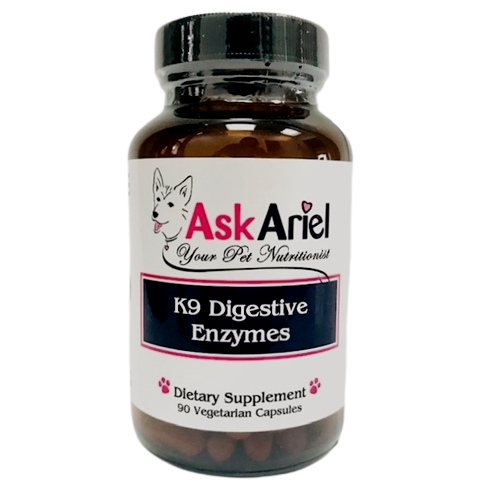IBD & IBS In Dogs: Types, Diagnosis, Symptoms & MoreIs your dog experiencing stomach gurgling and mucus in the stool? Has your pup been diagnosed with IBD or IBS? A holistic approach using natural remedies, fiber and diet changes can make a significant difference. Digestive enzymes aid in the breakdown of food supporting nutrient absorption and assisting in the management of IBS symptoms. Probiotics are beneficial bacteria that help provide balance in the gut microbiome which is often disrupted in dogs with IBD and IBS. Fiber is crucial in supporting a healthy gut and can help manage symptoms associated with IBD and IBS. When combined, these natural remedies: digestive enzymes, probiotics and fiber, work synergistically to provide a holistic and science-based approach to improve IBS symptoms in dogs. Diagnosing IBD in DogsInflammatory Bowel Disease (IBD) is a diagnosis used for a variety of intestinal disorders found in dogs. The disorders are characterized by an abnormal accumulation of inflammatory cells in the lining of the intestine. This can result in gas, mucus and bloody stool. Pets with IBD and IBS (irritable bowel syndrome) frequently experience diarrhea, vomiting and gurgling tummies. These conditions are commonly caused by or exacerbated by food intolerances or stress. If you frequently hear your dog's stomach making noises accompanied by vomiting or diarrhea, it’s possible that your canine companion is suffering from some type of irritable bowel syndrome. Some common types of IBD include: Lymphoplasmacytic EnteritisLymphoplasmacytic enteritis is the most common IBD in dogs. Lymphocytes and plasma cells infiltrate the lining of the stomach and intestine, and the body reacts to the intestinal bacteria by releasing immune cells that cause inflammation. The intensity and frequency of episodes generally increases over time. Eosinophilic EnteritisEosinophilic enteritis is when the lining of the stomach and intestines is infiltrated by eosinophils, a specific type of white blood cell. In some cases of eosinophilic enteritis, there appears to be an allergic response to dietary proteins. LymphangiectasiaLymphangiectasia is a disease in which the lymphatic vessels in the gastrointestinal tract (stomach, small intestines, and large intestines) dilate and become inflamed. This can result in the loss of protein through the intestines. It is common to be grouped with other diseases associated with malabsorption, such as protein-losing enteropathies (PLE). The lymphatic vessels help absorb fats from food. When the vessels are dilated and under pressure, they can rupture, and the lymph, cells, fats and proteins inside them will be lost. Though lymphangiectasia is not an inflammatory bowel disease, the clinical signs are very similar and secondary lymphangiectasia may develop as a result of severe and prolonged IBD. DiarrheaDiarrhea is not a disease, but an uncomfortable symptom of many different diseases. It is characterized by unformed, loose stools that occur in large amounts and/or more often than normal. There are two types of diarrhea in dogs:
ColitisColitis is an inflammation or irritation of the colon or large intestine. It commonly causes gooey diarrhea featuring mucus, fresh blood or both. It is often accompanied by cramping, gas and an urgency to defecate. Eating too many treats or raiding the trash can cause colitis, or it may be stress induced. Stress colitis in dogs can be the result of a trip to the vet or being left home alone. A pet can quickly become very weak and dehydrated from bloody stools. Dog colitis natural treatment includes supplements as well as dietary changes. Gastritis or GastroenteritisGastritis or gastroenteritis are inflammatory conditions of the gastrointestinal tract. Gastroenteritis is an inflammation of the stomach and intestines. Gastritis affects only the stomach. Both can be caused by bacteria, viruses, medications or foods. Both conditions can cause abdominal pain, diarrhea, and vomiting. Natural remedies can provide fast relief from the gas, pain and burning of an upset stomach. IBS & Inflammatory Bowel Disease in Dogs Natural TreatmentInflammatory Bowel Disease in dogs is a syndrome encompassing a variety of symptoms such as dog stomach gurgling, vomiting, diarrhea, colitis and mucous in stool. Natural remedies and diet changes can help treat your dog's symptoms naturally. Ask Ariel's IBD and IBS in dogs natural remedies have been helping pets feel better since 2005.  Inflammatory Bowel Disease (IBD) Kit - Our IBD Kit has been used successfully to help many dogs with inflammatory bowel disease (IBD), irritable bowel syndrome (IBS), protein-losing enteropathy (PLE), lymphangiectasia and chronic diarrhea. It is also a natural remedy for colitis in dogs. The IBD Kit contains three easy-to-use dog digestive supplements that work together to help firm up stool, control diarrhea and soothe digestive discomfort. The IBD Kit relieves pain and helps to repair your dog's intestinal lining by reducing inflammation. Each natural remedy may be purchased separately, but dog owners have seen the best results using all 3 digestive supplements together. Inflammatory Bowel Disease (IBD) Kit - Our IBD Kit has been used successfully to help many dogs with inflammatory bowel disease (IBD), irritable bowel syndrome (IBS), protein-losing enteropathy (PLE), lymphangiectasia and chronic diarrhea. It is also a natural remedy for colitis in dogs. The IBD Kit contains three easy-to-use dog digestive supplements that work together to help firm up stool, control diarrhea and soothe digestive discomfort. The IBD Kit relieves pain and helps to repair your dog's intestinal lining by reducing inflammation. Each natural remedy may be purchased separately, but dog owners have seen the best results using all 3 digestive supplements together.  Power Probiotic - With Power Probiotic, you’ve found one of the best probiotics for dogs! This multi-strain probiotic contains prebiotics and six strains of beneficial bacteria which are live, viable organisms to repopulate the good, friendly bacteria that your dog needs. Pure, safe and natural---a product you can trust. Absolutely no fillers. Power Probiotic is carefully manufactured, GMP certified and guaranteed to survive your pet's stomach acid. Made in the USA. Most pets love the taste of Power Probiotic! Power Probiotic - With Power Probiotic, you’ve found one of the best probiotics for dogs! This multi-strain probiotic contains prebiotics and six strains of beneficial bacteria which are live, viable organisms to repopulate the good, friendly bacteria that your dog needs. Pure, safe and natural---a product you can trust. Absolutely no fillers. Power Probiotic is carefully manufactured, GMP certified and guaranteed to survive your pet's stomach acid. Made in the USA. Most pets love the taste of Power Probiotic!.png) Happy Paws Organic Hemp Extract - Dogs with IBS and IBD may experience cramping, stomach gurgling and other symptoms. Happy Paws Drops help relieve pain and inflammation and have a calming effect. A few drops of this professional veterinary strength CBD oil provide comforting relief of the symptoms of IBD and IBS. Happy Paws Drops are easy-to-administer. Each 1oz bottle contains 550mg of full-spectrum hemp extract in an unflavored all-natural coconut oil base. 100% organic. Made in the USA. Happy Paws Organic Hemp Extract - Dogs with IBS and IBD may experience cramping, stomach gurgling and other symptoms. Happy Paws Drops help relieve pain and inflammation and have a calming effect. A few drops of this professional veterinary strength CBD oil provide comforting relief of the symptoms of IBD and IBS. Happy Paws Drops are easy-to-administer. Each 1oz bottle contains 550mg of full-spectrum hemp extract in an unflavored all-natural coconut oil base. 100% organic. Made in the USA. K9 Digestive Enzymes - This dog digestive enzyme supplement is the #1 choice for dogs with malabsorption. It helps to maintain normal digestive function. It contains pancreatin and ox bile for increased absorption of proteins and fats. An adequate level of hydrochloric acid (HCL) is essential for the proper functioning of the digestive system. It activates the digestive enzymes that break down foods. An optimal level of stomach acid can keep the digestive system free of bacteria, yeast and parasites. K9 Digestive Enzymes - This dog digestive enzyme supplement is the #1 choice for dogs with malabsorption. It helps to maintain normal digestive function. It contains pancreatin and ox bile for increased absorption of proteins and fats. An adequate level of hydrochloric acid (HCL) is essential for the proper functioning of the digestive system. It activates the digestive enzymes that break down foods. An optimal level of stomach acid can keep the digestive system free of bacteria, yeast and parasites.
Gracie
"Thank you so much for your amazing products. In such a short amount of time, our nine year old Yorkie Maltese Mix started getting huge relief from Lymphangiectasia. She had less bloating and gas, no more diarrhea, more energy, put on weight and not as weak. These supplements seem to combat the negative side effects of the prednisone. She has her energy back and you can tell she feels so much better. Thank you for saving my sweet Gracie girl. Sincere Thanks!" - Jennifer, Ohio Common Symptoms of IBD
Diarrhea, Vomiting from IBD & When to Contact a VetDog vomiting and diarrhea can occur due to a change in diet, stress, dietary indiscretion (eating out of the trash can or scavenging outdoors) or a parasitic or bacterial infection. These episodes of dog vomiting and diarrhea usually resolve within a few days. If dog vomiting and diarrhea persist for more than a few hours, it is essential to contact your veterinarian. Dogs can quickly become weak and dehydrated. Bloody diarrhea or mucus in the stool can be signs of a more critical condition, such as inflammatory bowel disease (IBD), liver disease, protein-losing enteropathy (PLE), exocrine pancreatic insufficiency (EPI) or even cancer. Your veterinarian will perform a full exam and take a complete history of your dog's symptoms. Fecal tests, X-rays, an ultrasound, an endoscopy and/or intestinal biopsies may be necessary for a diagnosis. Treatments for vomiting, diarrhea and bowel disorders will depend on the underlying health condition. It may be as simple as adding pumpkin to your dog's food, or it may require medication along with diet changes. Diet is a huge component in the management of most cases of chronic diarrhea in dogs. Recommended Diet for Dogs With IBD & DiarrheaMany dogs experience digestive problems due to food allergies or food intolerances. Dogs with inflammatory bowel disease (IBD) and chronic diarrhea can benefit from a low carbohydrate, grain-free, hypoallergenic diet. Pet owners are often looking for the best homemade diet for dogs with IBD. Finding the right diet for your dog can be quite a challenge. IBS and IBD in dogs can make pets very sensitive and picky. It is very important to avoid proteins that your dog may not tolerate. For example, poultry can be a problem for many dogs with IBD. Some prescription diets contain chemicals and grains which may not be well tolerated by every dog. Dry kibble can be especially difficult for pets to digest as well. Want to know the best diet for your dog? Include what you are feeding your dog on the order form at checkout. Our nutritionist will include a free diet suggestion for your dog based on the information you provide on the packing slip that comes with your product directions. Ask Ariel has had many success stories, and we have had extensive experience working with dogs that have these conditions. Pumpkin Can Help Dogs with IBS and IBDPumpkin is helpful for dogs with IBS and IBD. A small amount of pure canned pumpkin (not raw or the sugary, spicy pie filling) mixed into your dog's food can help with digestive problems, diarrhea, loose stool or constipation. If your dog has diarrhea, the soluble fiber in pumpkin will help absorb the excess water, helping to firm up the stool. The high fiber content in pumpkin helps to regulate the natural wave action of the intestinal tract. It is also a good source of natural vitamin A, vitamin C and antioxidants. Due to the additional fiber, a daily dose of pumpkin can help your dog feel full longer and may help promote weight loss. Originally published Oct 11, 2022 Updated April 4, 2024 Written by: Susan Davis, Pet Health Nutritionist, CCN All pet treatment protocols and pet treatment supplements have been reviewed and approved by a veterinarian |